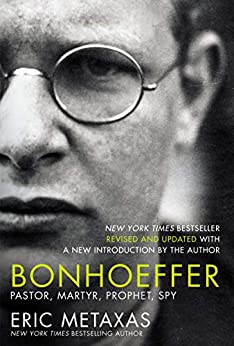More on this book
Community
Kindle Notes & Highlights
dream, the white fog rises in the air. * It is a sweet and noble thing to die for one’s country. * “Lullabye of the Stream” from Die Schöne Müllerin. ** It was the term they sometimes used for their governess, Maria van Horn. * “Jerusalem, Thou City Fair and High.” * An illegal, pro-Communist newspaper. * Philipp Scheidemann (1865–1939) was a German politician. * Kreutzer was a German Jew later targeted by the Nazis (Alfred Rosenberg in particular) as a “cultural enemy,”
For him, ideas and beliefs were nothing if they did not relate to the world of reality outside one’s mind.
For him, philosophy was man’s search for truth apart from God. It was a type of Barth’s “religion,” in which man himself tried to reach heaven or truth or God. But theology begins and ends with faith in Christ, who reveals himself to man; apart from such revelation, there could be no such thing as truth. Thus the philosopher—and the theologian who operates on a philosopher’s assumptions—chases his own tail and gazes at his own navel. He cannot break out of that cycle, but God, via revelation, can break in.
we often ask ourselves whether we still need the Church, whether we still need God. But this question, he said, is wrong. We are the ones who are questioned. The Church exists and God exists, and we are asked whether we are willing to be of service, for God needs us.
One wished to arrive at answers that could stand up to every scrutiny because one would have to live out those conclusions.
[He said] when you read the Bible, you must think that here and now God is speaking with me. . . . He wasn’t as abstract as the Greek teachers and all the others. Rather, from the very beginning, he taught us that we had to read the Bible as it was directed at us, as the word of God directly to us. Not something general, not something generally applicable, but rather with a personal relationship to us. He repeated this to us very early on, that the whole thing comes from that.
less than the very word of God, a place where God would speak to his people. Bonhoeffer wanted to impress this idea on his ordinands, to help them see that preaching was not merely an intellectual exercise. Like prayer or meditation on a scriptural text, it was an opportunity to hear from heaven, and for the preacher, it was a holy privilege to be the vessel through whom God would speak. Like the incarnation, it was a place of revelation, where Christ came into this world from outside it.
He wished to impress upon his ordinands that when one truly presented the Word of God, it would undo people because it had the innate power to help them see their own need and would give the answer to that need in a way that was not larded over with “religion” or false piety. The grace of God, without filters or explanation, would touch people.
Bonhoeffer was wondering if it wasn’t time to bring God into the whole world and stop pretending he wanted only to live in those religious corners that we reserved for him:
Bonhoeffer’s theology had always leaned toward the incarnational view that did not eschew “the world,” but that saw it as God’s good creation to be enjoyed and celebrated, not merely transcended. According to this view, God had redeemed mankind through Jesus Christ, had re-created us as “good.” So we weren’t to dismiss our humanity as something “un-spiritual.” As Bonhoeffer had said before, God wanted our “yes” to him to be a “yes” to the world he had created.
For Bonhoeffer, there is no reality apart from God and no goodness apart from him.
As long as Christ and the world are conceived as two realms bumping against and repelling each other, we are left with only the following options. Giving up on reality as a whole, either we place ourselves in one of the two realms, wanting Christ without the world or the world without
Christ—and in both cases we deceive ourselves. . . . There are not two realities, but only one reality, and that is God’s reality revealed in Christ in the reality of the world. Partaking in Christ, we stand at the same time in the reality of God and in the reality of the world. The reality of Christ embraces the reality of the world in itself. The world has no reality of its own independent of God’s revelation in Christ. . . . [T]he theme of two realms, which has dominated the history of the church again and again, is foreign to the New Testament.


